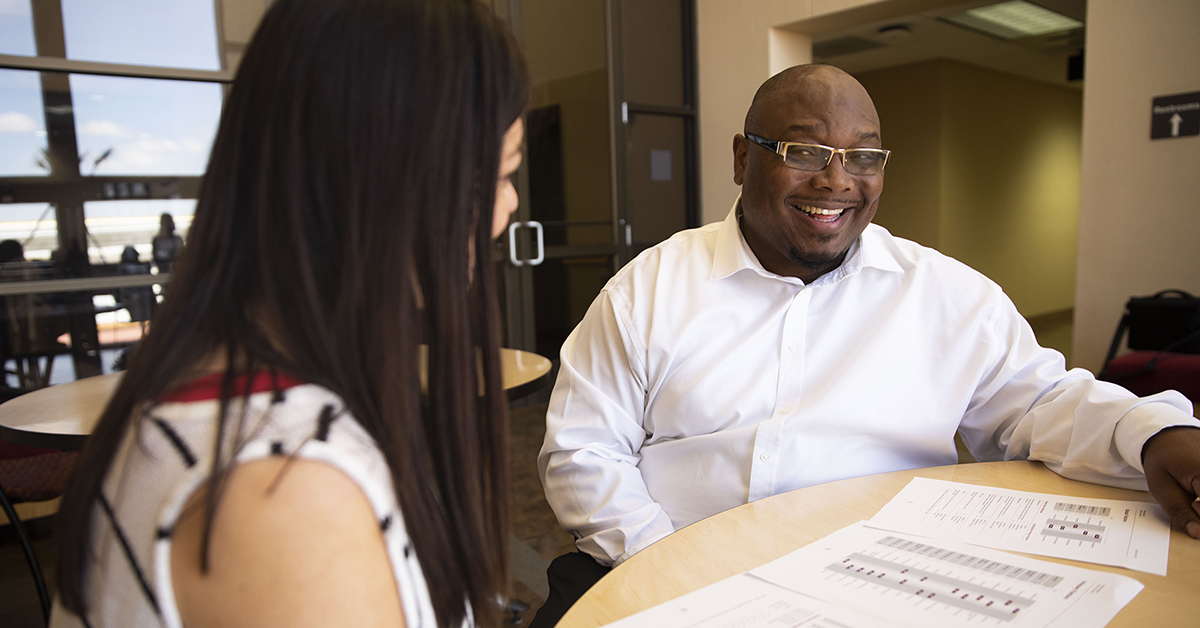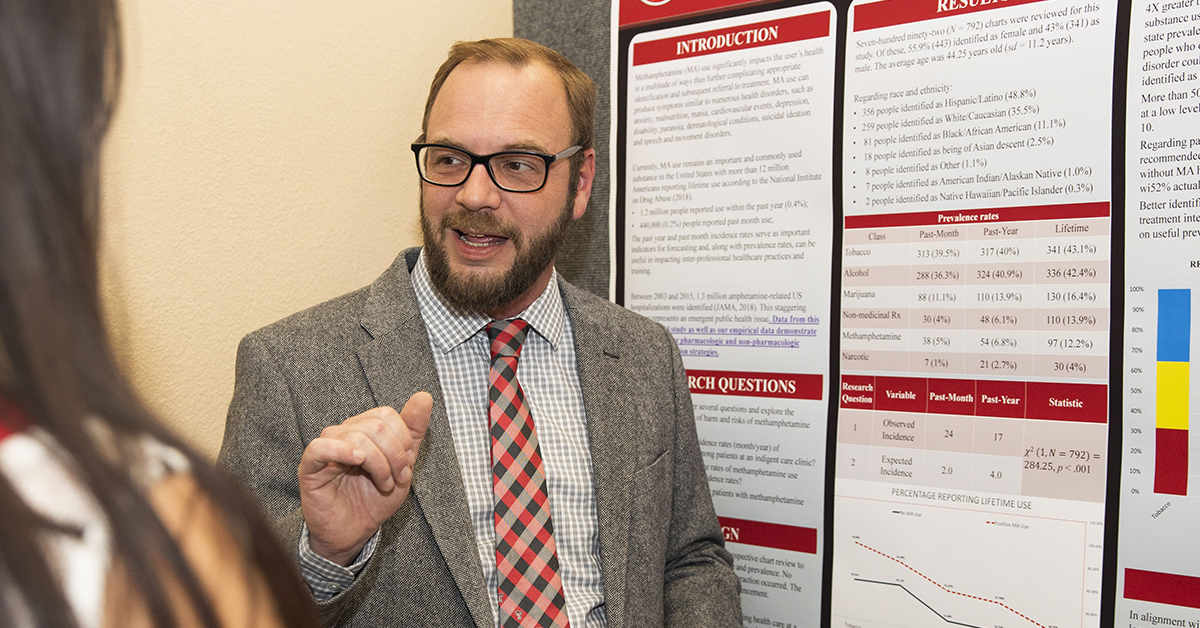More Than a Substance Abuse Counseling Degree: Making a Difference

Some professions are, in fact, more of a calling. This is especially true for individuals who have been personally impacted by something difficult in their lives and who are then driven to reach out and help others in similar circumstances. Such is the case with addiction counselors, as well as those who pursue a substance abuse counseling degree and advanced preparation to work with individuals struggling with all kinds of addictions.
When the issue of addiction is brought up, most people immediately think of substance abuse, and for good reason. According to the Center on Addiction, approximately 16% of the U.S. population over the age of 12 struggles with substance abuse related to nicotine, alcohol, illegal drugs, and prescription drugs.
But there are other types of compulsive behavior, such as those related to gambling and food, that can be equally destructive when left untreated.
This is where the knowledge, skill, and compassion of well-trained addiction and substance abuse counselors can literally change lives for the better. And it’s why the Master of Science in Addiction Counseling Program at the Texas Tech University Health Sciences Center School of Health Professions (TTUHSC-SHP) is more than a substance abuse counseling degree.
One TTUHSC-SHP Faculty Member’s Compelling Story
Addiction counselors can have a profound impact on the lives of those they serve: a powerful case in point is TTUHSC-SHP faculty member, Dr. Chris Townsend.
“I’ve been around addiction all my life. I’ve had family members who struggled with addiction,” says Townsend, an assistant professor in the Program. “So when the opportunity presented itself to study counseling, I chose to focus on addictions because it was an area that made the most sense to me personally and because it can permeate all other counseling disciplines. I saw it as a way to help people who were suffering.”
After graduating from a highly-regarded undergraduate substance abuse counseling degree program in North Carolina, Townsend was recruited for a paid internship at an addiction facility while he pursued his master’s degree. Upon earning his master’s degree, he was offered a full-time position at the facility. “It was an immersive experience. I conducted outpatient counseling, substance abuse counseling, worked with adolescent substance abuse disorders, as well as adult chronic users who needed detox,” Townsend says.
Townsend’s passion for helping those struggling with addictions would take him overseas to Africa, where he spent time conducting mission work and counseling in countries such as Liberia and Rwanda.
“With all of the war and genocide happening in those countries, they would use drugs on the children who were being used to fight as soldiers,” Townsend says. “They would get them hooked and these children would end up suffering for years from the ills that came from that addiction.”
The experience in Africa impacted Townsend to the point where he wanted to take his work to a higher level so he could work with local governments and be involved with policymaking. After meeting with the local ministry of health, he determined that he would need a Ph.D. to work in those capacities.
“I had maxed out the work I was able to do at the master’s degree level, so I decided to come back and get my Ph.D. so that I could one day continue with that important work,” Townsend recalls.
The Road to TTUHSC-SHP
After returning to the U.S. and starting to work towards his doctorate, Townsend had a career-altering encounter while attending a professional conference in California. It was there that he met Dr. Zach Sneed, Program Director of the TTUHSC-SHP Master of Science in Addiction Counseling program. There were faculty openings within the program, and Townsend was encouraged to look into it while finishing work on his Ph.D. He did, and after a rigorous eight-hour interview process, he was offered a faculty position in the respected and unique program.

One of the many things that appealed to Townsend about the opportunity at TTUHSC-SHP is that it’s one of just a few master’s programs in addiction counseling nationwide, and one of even fewer offered entirely online to meet the needs of working professionals. Equally important, he says, is the program’s core mission and deep history of serving the needs of those living in the community who are in need of help. It is a program enhanced by the substantial expertise of its faculty. “Between us, Dr. Sneed and I have more than 25 years of experience working in the addiction field,” says Townsend.
“The quality of the program and its reputation throughout Texas and across the country was very clear to me,” Townsend adds. “A big part of the mission here is to serve the needs of the community. And I like the way students are able to get involved with clinical work, providing that essential help and treatment and adding invaluable practical experience to the context of what they’re learning in the program.”
Townsend appreciates that at TTUHSC-SHP, students gain more than a substance abuse counseling degree. He says the program offers an uncommon multicultural perspective, as well as an interdisciplinary focus that is lacking in other programs offered around the country.
“There’s been a lot of discussion in our profession over the years about taking a more multidisciplinary approach like this, but the follow-through has been lacking,” he says. “That’s not the case here. We’re doing it. It’s happening. It stretches the way our students think about how to serve people in a more holistic way.”
“Students in this program enjoy a very rich, interdisciplinary experience that gives them a breadth of perspective that will set them apart,” Townsend says. “In the first 36 credit hours of the program, our students are in courses exploring other areas of counseling and interacting with peers who are studying mental health counseling and rehabilitation counseling. They’re in courses being led by faculty from those other areas. When they get out into practice, they’re going to find that all of these areas do, in fact, intersect. And this is going to give them the mindset and outlook they’ll need to more effectively provide treatment to those suffering with addictions.”
Innovation and Preparing Students for the Wave of the Future in Treatment
A key hallmark of the Master of Science in Addiction Counseling program at TTUHSC-SHP is its commitment to innovation and to preparing students at the highest level to be ready for the demands of the profession from day one.
One example of the program’s career-ready focus is the introduction that all students get to the practice of telemedicine and telehealth. Telehealth is a way of providing high-quality patient care, clinical treatment and health-related education over long distances through the use of technology such as video conferencing, streaming media, and wired and wireless communication.
“Telemedicine and telehealth is the wave of the future,” Townsend says. “Students in our program are spread out all over the country, across Texas, and here in West Texas. Many of them, especially those in West Texas, live in rural areas and understand that these are areas where people aren’t always going to have easy access to the rural health services they may need. We’ve been very proactive in introducing and integrating telehealth practices as a way to align the preparation of our students with the realities they’re going to encounter. So when they graduate and get out into practice they will have been exposed to it already; it won’t be new to them.”
TTUHSC-SHP is in the process of launching a new telehealth clinic led by Dr. Townsend that will feature state-of-the-art equipment and facilities. “This is a cutting-edge and innovative initiative that will allow our students to gain really valuable experiences and round out their learning and preparation in a unique way that, ultimately, will enable them to better meet the needs of those they’re serving,” he says.

In addition to the master’s degree, students who complete the program at TTUHSC-SHP also are awarded a certificate indicating they’ve gained training in telehealth.
A Student-Centered Master’s Degree Experience
Townsend is part of a faculty at TTUHSC-SHP that prides itself on being accessible to students, and on being part of a master’s degree experience that’s focused on students’ goals and needs. One of the few programs of its kind offered entirely online, the TTUHSC-SHP program allows students to engage in an experience that can be molded around the demands of their daily lives, while still maintaining high levels of interaction with faculty and fellow students.
The program, which utilizes Zoom video conferencing technology and Sakai management software for the delivery of courses, is anything but an isolating experience for students. Students in the program interact with fellow students through real-time course discussions and projects and directly engage with faculty. For lecture-based courses, students can access course videos anytime, from anywhere, if they aren’t able to attend while the course is happening.
“This is a very comprehensive, complex and rigorous program. The online aspect of it doesn’t take any of that away,” Townsend says. “The preparation students receive is no different from what they would receive if they were physically sitting in a classroom. And as faculty, we’re here for them. I just started offering extra classes for the advanced addictions course because it’s a very tough course and we want to do anything we can to position students to succeed.”
“We offer a lot of clinical courses using the Zoom software,” he continues. “Students develop skills in group counseling and learn how to do group therapy this way, the technology is phenomenal. And we have site supervisors out in the field to work with students during clinicals and practica.”
More Than a Substance Abuse Counseling Degree — A Calling to Serve
Students in the program gain a holistic and well-rounded master’s degree experience, where they’re supported and mentored at a distinctive level.
“We’re here for our students 48 hours a week year-round. That’s pretty unusual,” Townsend says. “My students know that I’m here and that they can call me if they have questions about anything. We support our students by phone and email, they get all the IT support they may need, and we embrace universal design concepts, including web accessibility and disability support services. They can access course content seamlessly, they can get the Powerpoint slides, course transcripts, audio. We’re very sensitive to doing everything we can to meet our students’ needs. They can access anything they need on their own time.”
Most students in the program come from professional positions that in one way or another are related to the field of counseling, but not all. Townsend says he’s seen teachers and even pilots come through the program. The student body is a very unique and vibrant blend of working professionals who bring a wide variety of professional backgrounds and perspectives to the virtual classroom experience.
Townsend notes some common characteristics and personality traits that, in his opinion, help students thrive in the TTUHSC-SHP program.
“It helps if students have a personal vision for their lives; part of that vision gives them a reason to pursue this as a career,” Townsend says. “They need to be open to all cultures and all different kinds of people. They need to put any preconceived biases aside. They need to have a love for humanity and be motivated to help others. And they need to have a lot of patience.”
“We always encourage counselors to go get counseling themselves,” he says. “No two people are the same. Just because a certain technique or method works with one person doesn’t mean it will work with everyone. There’s an art and a science to what we do. Anyone thinking about this program needs to have a willingness to never stop learning. I’ve been doing this for 20 years and still, I am learning every day. It takes a lifelong commitment.”
Ready to Learn More About the Master’s Degree in Addiction Counseling at TTUHSC?
If you have a vision for your future and it involves counseling those who are struggling with addiction, the program at TTUHSC-SHP can provide the ideal path to realizing that career goal.
For more information on applying to the TTUHSC-SHP MSAC degree program, email us at health.professions@ttuhsc.edu, call (806) 743-3220, or visit the Master of Science in Addiction Counseling program page.
Related Stories
Celebrating Veterans: TTUHSC’s General Martin Clay’s Legacy of Service and Leadership
From his initial enlistment in the Army National Guard 36 years ago to his leadership in military and civilian health care management roles, Major General Martin Clay’s career has been shaped by adaptability, mission focus and service to others.
Texas Tech University Health Sciences Center School of Nursing Named Best Accelerated Bachelor of Science in Nursing Program in Texas
The TTUHSC School of Nursing Accelerated Bachelor of Science in Nursing (BSN) program has been ranked the No. 1 accelerated nursing program in Texas by RegisteredNursing.org.
TTUHSC Names New Regional Dean for the School of Nursing
Louise Rice, DNP, RN, has been named regional dean of the TTUHSC School of Nursing on the Amarillo campus.
Recent Stories
The John Wayne Cancer Foundation Surgical Oncology Fellowship Program at Texas Tech University Health Sciences Center Announced
TTUHSC is collaborating with the John Wayne Cancer Foundation and has established the Big Cure Endowment, which supports the university’s efforts to reduce cancer incidence and increase survivability of people in rural and underserved areas.
TTUHSC Receives $1 Million Gift from Amarillo National Bank to Expand and Enhance Pediatric Care in the Panhandle
TTUHSC School of Medicine leaders accepted a $1 million philanthropic gift from Amarillo National Bank on Tuesday (Feb. 10), marking a transformational investment in pediatric care for the Texas Panhandle.
Texas Tech University Health Sciences Center Permian Basin Announces Pediatric Residency Program Gift
TTUHSC Permian Basin, along with the Permian Strategic Partnership and the Scharbauer Foundation, Feb. 5 announced a gift that will fund a new pediatric residency.
